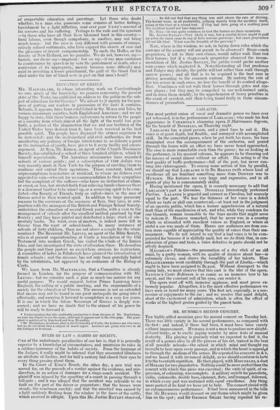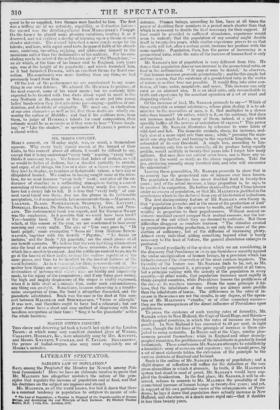MR. HUMMEL'S SECOND CONCERT.
THE highly-gifted musician gave his second concert on Tuesday last. There was little variety in his second performance, as compared with the first ; and indeed, if there had been, it must have been variety without improvement. HUMMEL is not a man to produce new sleight- of-hand tricks, or to excite gaping wonder by mere feats of manual dexterity. His playing is precisely what we expected to find it, the result of a genius alive to all the powers of his art, trained in the best of all possible schools—the school in which mind and thought are brought to bear upon every passage, and in which the heart is appealed to through the medium of the senses. He repeated his concerto in A 1), and we heard it with increased delight, as we should continue to hear it to the twentieth repetition. He then played, with MOSCHELES, a duet of MOZART for two pianofortes. Nothing could be more perfect than the concert with which this piece was executed ; the unity of spirit, of ex- pression, of colouring, was complete. A military septett for pianoforte, violin, violoncello, double bass, clarionet, flute, and trumpet, followed, in which every part was sustained with equal excellence. Any thing more perfect of its kind we have yet to hear. The concert closed with an extemporaneous performance. It had been announced in the bills that Mr. HUMMEL would descant on any theme which might be given him on the spot ; and Sir GEORGE SMART having repeated his re- quest to be so supplied, two themes were handed to him. The first was a trifling air Of no notoriety, capability, or distinctive feature : the second was the drinking-chorus from MARSCHNER'S Vampyr. On the former he played some pleasing variations, treating it as it deserved; and not making a display of learning upon a theme of such slender materials. The second furnished a more ample scope for his talents ; and here, with equal good taste, he poured forth of his abund- ance, enriching, inverting, replying, and addressing himself to the musicians rather than the fashionables of his auditory. For his con- cluding rondo he selected the well-known air of " the Plough-boy,"— an air which, at the time of his former visit to England, forty years ago, was at the height of its popularity ; and which furnished him, as it had furnished Dussenc, with an excellent theme for florid exe- cution. His conclusion was more dazzling than any thing we had previously heard from him. Of the rest of the performance we are constrained to say some- thing in our own defence. We advised Mr. HUMMEL to produce, at his next concert, some of his vocal music ; but we certainly little expected to be treated with two duets about equal in merit to the easy Notturni of BLANGINI or SOLA, such as are put into young ladies' hands when they first adventure part-singing—guiltless of mo- dulation, and destitute of originality. We must say, in vindication of our own character as well as his, that these duets are wholly un- worthy the author of Matilda ; and that if his auditors were, from them, to judge of HUMMEL'S talents for vocal composition, their estimate would he as accurate as if they were to hear " Venus laugh- ing," or " Like the shadow," as specimens of HANDEL'S powers as a choral writer.



















 Previous page
Previous page